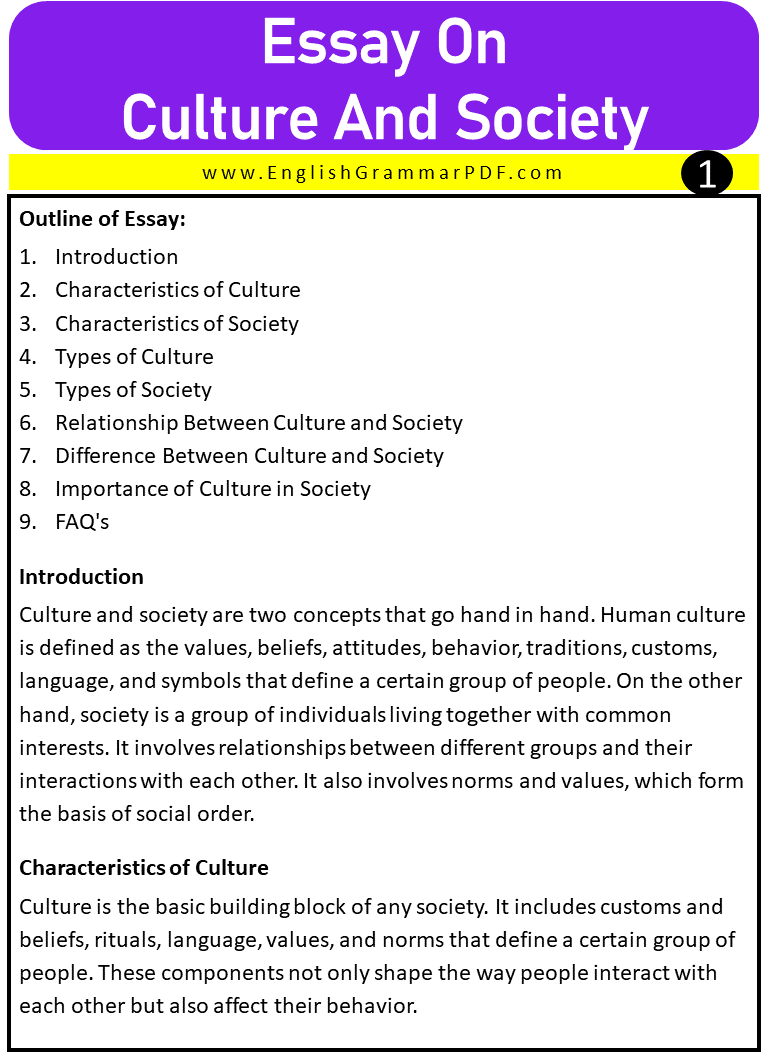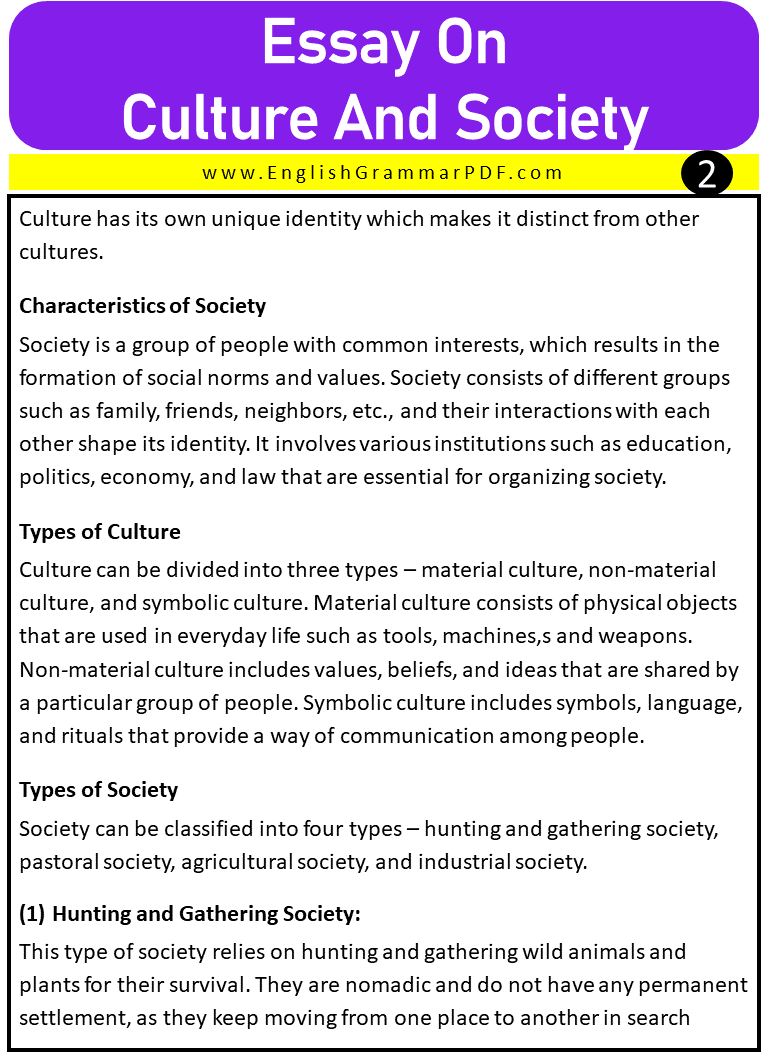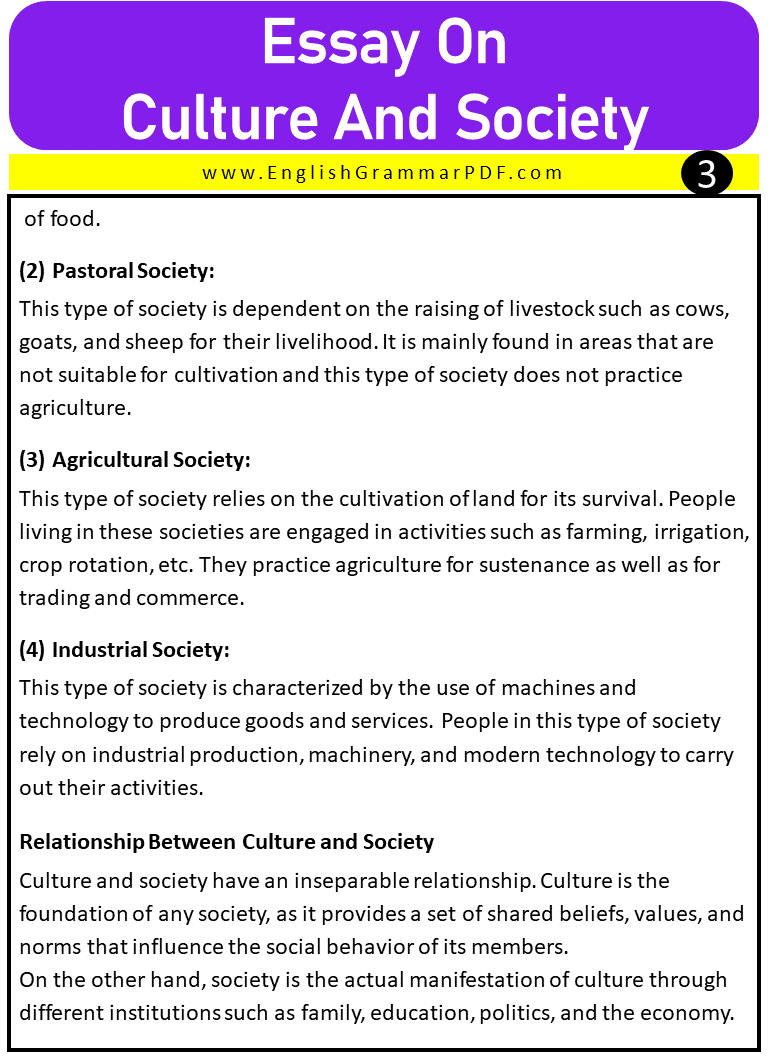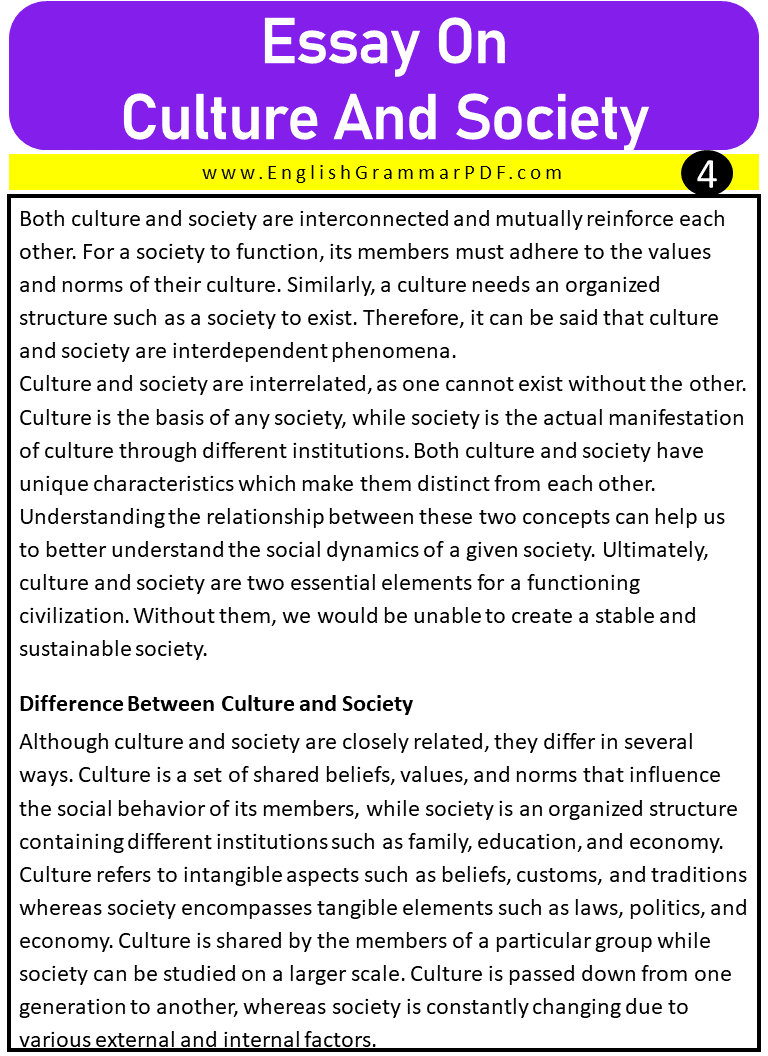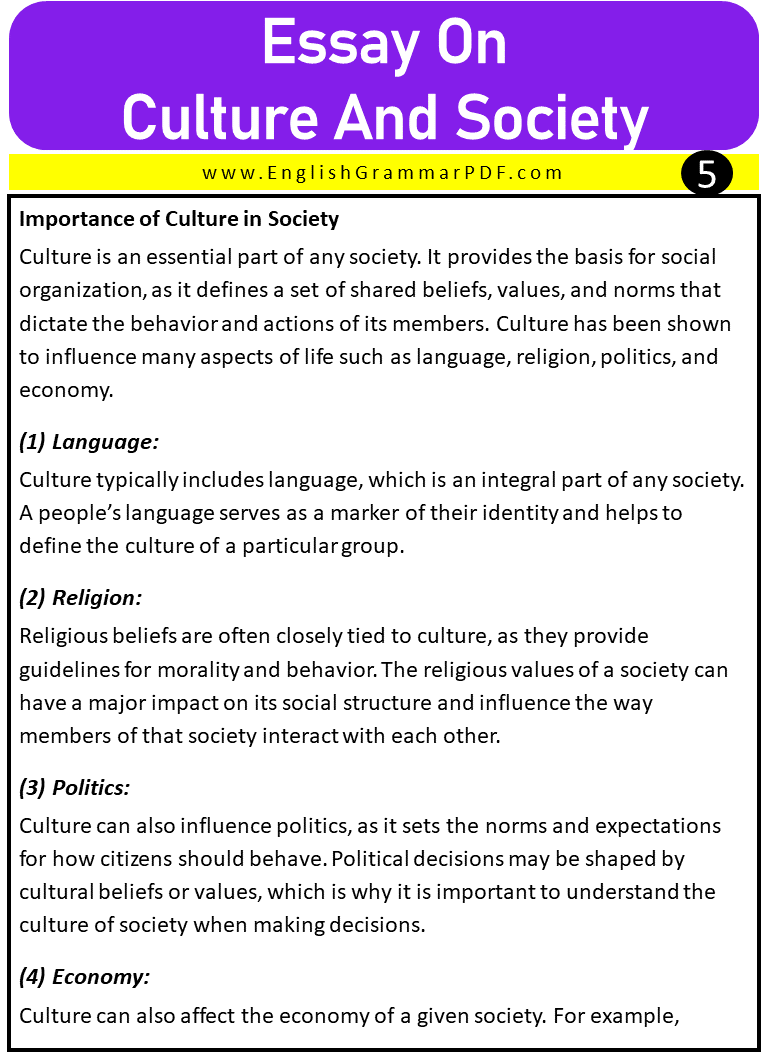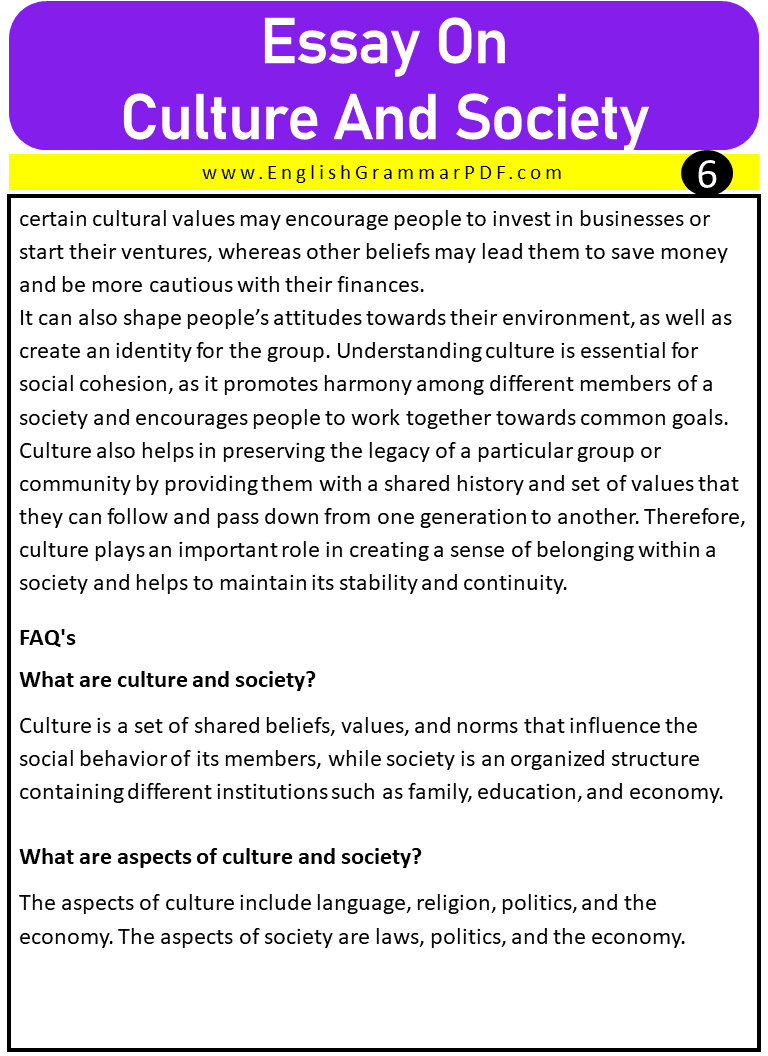Essay On Culture And Society
Outline of Essay:
- Introduction
- Characteristics of Culture
- Characteristics of Society
- Types of Culture
- Types of Society
- Relationship Between Culture and Society
- Difference Between Culture and Society
- Importance of Culture in Society
- FAQ’s

Discover more:
Introduction
Culture and society are two concepts that go hand in hand. Human culture is defined as the values, beliefs, attitudes, behavior, traditions, customs, language, and symbols that define a certain group of people. On the other hand, society is a group of individuals living together with common interests. It involves relationships between different groups and their interactions with each other. It also involves norms and values, which form the basis of social order.
Characteristics of Culture
Culture is the basic building block of any society. It includes customs and beliefs, rituals, language, values, and norms that define a certain group of people. These components not only shape the way people interact with each other but also affect their behavior. Culture has its own unique identity which makes it distinct from other cultures.
Characteristics of Society
Society is a group of people with common interests, which results in the formation of social norms and values. Society consists of different groups such as family, friends, neighbors, etc., and their interactions with each other shape its identity. It involves various institutions such as education, politics, economy, and law that are essential for organizing society.
Types of Culture
Culture can be divided into three types – material culture, non-material culture, and symbolic culture. Material culture consists of physical objects that are used in everyday life such as tools, machines,s and weapons.
Non-material culture includes values, beliefs, and ideas that are shared by a particular group of people. Symbolic culture includes symbols, language, and rituals that provide a way of communication among people.
Types of Society
Society can be classified into four types – hunting and gathering society, pastoral society, agricultural society, and industrial society.
(1) Hunting and Gathering Society:
This type of society relies on hunting and gathering wild animals and plants for their survival. They are nomadic and do not have any permanent settlement, as they keep moving from one place to another in search of food.
(2) Pastoral Society:
This type of society is dependent on the raising of livestock such as cows, goats, and sheep for their livelihood. It is mainly found in areas that are not suitable for cultivation and this type of society does not practice agriculture.
(3) Agricultural Society:
This type of society relies on the cultivation of land for its survival. People living in these societies are engaged in activities such as farming, irrigation, crop rotation, etc. They practice agriculture for sustenance as well as for trading and commerce.
(4) Industrial Society:
This type of society is characterized by using machines and technology to produce goods and services. People in this type of society rely on industrial production, machinery, and modern technology to carry out their activities.
Relationship Between Culture and Society
Culture and society have an inseparable relationship. Culture is the foundation of any society, as it provides a set of shared beliefs, values, and norms that influence the social behavior of its members.
On the other hand, society is the actual manifestation of culture through different institutions such as family, education, politics, and the economy.
Both culture and society are interconnected and mutually reinforce each other. For a society to function, its members must adhere to the values and norms of their culture. Similarly, a culture needs an organized structure such as a society to exist. Therefore, it can be said that culture and society are interdependent phenomena.
Culture and society are interrelated, as one cannot exist without another. Culture is the basis of any society, while society is the actual manifestation of culture through different institutions. Both culture and society have unique characteristics which make them distinct from each other.
Understanding the relationship between these two concepts can help us to better understand the social dynamics of a given society. Ultimately, culture and society are two essential elements for a functioning civilization. Without them, we would be unable to create a stable and sustainable society.
Difference Between Culture and Society
Although culture and society are closely related, they differ in several ways. Culture is a set of shared beliefs, values, and norms that influence the social behavior of its members, while society is an organized structure containing different institutions such as family, education, and economy.
Culture refers to intangible aspects such as beliefs, customs, and traditions whereas society encompasses tangible elements such as laws, politics, and economy. Culture is shared by the members of a particular group while society can be studied on a larger scale. Culture is passed down from one generation to another, whereas society is constantly changing due to various external and internal factors.
Importance of Culture in Society
Culture is an essential part of any society. It provides the basis for social organization, as it defines a set of shared beliefs, values, and norms that dictate the behavior and actions of its members. Culture has been shown to influence many aspects of life such as language, religion, politics, and economy.
(1) Language:
Culture typically includes language, which is an integral part of any society. A people’s language serves as a marker of their identity and helps to define the culture of a particular group.
(2) Religion:
Religious beliefs are often closely tied to culture, as they provide guidelines for morality and behavior. The religious values of a society can have a major impact on its social structure and influence the way members of that society interact with each other.
(3) Politics:
Culture can also influence politics, as it sets the norms and expectations for how citizens should behave. Political decisions may be shaped by cultural beliefs or values, which is why it is important to understand the culture of society when making decisions.
(4) Economy:
Culture can also affect the economy of a given society. For example, certain cultural values may encourage people to invest in businesses or start their ventures, whereas other beliefs may lead them to save money and be more cautious with their finances.
It can also shape people’s attitudes towards their environment, as well as create an identity for the group. Understanding culture is essential for social cohesion, as it promotes harmony among different members of a society and encourages people to work together towards common goals.
Culture also helps in preserving the legacy of a particular group or community by providing them with a shared history and set of values that they can follow and pass down from one generation to another. Therefore, culture plays an important role in creating a sense of belonging within a society and helps to maintain its stability and continuity.
FAQ’s
What are culture and society?
Culture is a set of shared beliefs, values, and norms that influence the social behavior of its members, while society is an organized structure containing different institutions such as family, education, and economy.
What are aspects of culture and society?
The aspects of culture include language, religion, politics, and the economy. The aspects of society are laws, politics, and the economy.
Why is culture important to society?
Culture is important to a society because it provides the shared beliefs, values, and norms that dictate the behavior and actions of its members. It also serves as a marker of identity, shapes people’s attitudes toward their environment, and encourages social cohesion by promoting harmony among different members of society.
How does culture influence politics?
Culture can influence politics by setting the norms and expectations for how citizens should behave. Political decisions may be shaped by cultural beliefs or values, which is why it is important to understand the culture of society when making decisions.
Download PDF of Essay On Culture And Society
